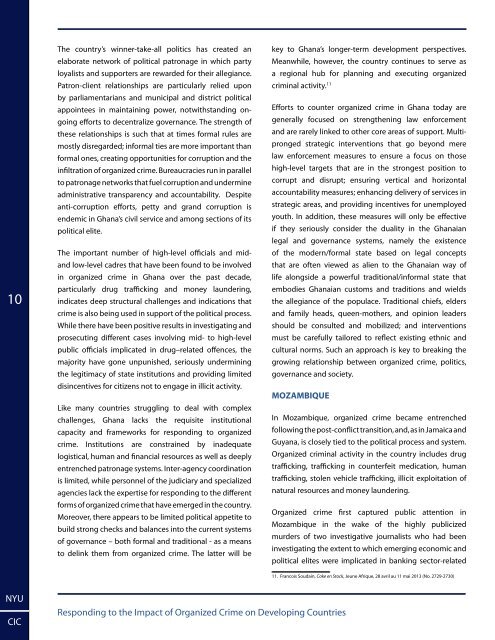here - Center on International Cooperation - New York University
here - Center on International Cooperation - New York University
here - Center on International Cooperation - New York University
You also want an ePaper? Increase the reach of your titles
YUMPU automatically turns print PDFs into web optimized ePapers that Google loves.
10<br />
The country’s winner-take-all politics has created an<br />
elaborate network of political patr<strong>on</strong>age in which party<br />
loyalists and supporters are rewarded for their allegiance.<br />
Patr<strong>on</strong>-client relati<strong>on</strong>ships are particularly relied up<strong>on</strong><br />
by parliamentarians and municipal and district political<br />
appointees in maintaining power, notwithstanding <strong>on</strong>going<br />
efforts to decentralize governance. The strength of<br />
these relati<strong>on</strong>ships is such that at times formal rules are<br />
mostly disregarded; informal ties are more important than<br />
formal <strong>on</strong>es, creating opportunities for corrupti<strong>on</strong> and the<br />
infiltrati<strong>on</strong> of organized crime. Bureaucracies run in parallel<br />
to patr<strong>on</strong>age networks that fuel corrupti<strong>on</strong> and undermine<br />
administrative transparency and accountability. Despite<br />
anti-corrupti<strong>on</strong> efforts, petty and grand corrupti<strong>on</strong> is<br />
endemic in Ghana’s civil service and am<strong>on</strong>g secti<strong>on</strong>s of its<br />
political elite.<br />
The important number of high-level officials and midand<br />
low-level cadres that have been found to be involved<br />
in organized crime in Ghana over the past decade,<br />
particularly drug trafficking and m<strong>on</strong>ey laundering,<br />
indicates deep structural challenges and indicati<strong>on</strong>s that<br />
crime is also being used in support of the political process.<br />
While t<str<strong>on</strong>g>here</str<strong>on</strong>g> have been positive results in investigating and<br />
prosecuting different cases involving mid- to high-level<br />
public officials implicated in drug–related offences, the<br />
majority have g<strong>on</strong>e unpunished, seriously undermining<br />
the legitimacy of state instituti<strong>on</strong>s and providing limited<br />
disincentives for citizens not to engage in illicit activity.<br />
Like many countries struggling to deal with complex<br />
challenges, Ghana lacks the requisite instituti<strong>on</strong>al<br />
capacity and frameworks for resp<strong>on</strong>ding to organized<br />
crime. Instituti<strong>on</strong>s are c<strong>on</strong>strained by inadequate<br />
logistical, human and financial resources as well as deeply<br />
entrenched patr<strong>on</strong>age systems. Inter-agency coordinati<strong>on</strong><br />
is limited, while pers<strong>on</strong>nel of the judiciary and specialized<br />
agencies lack the expertise for resp<strong>on</strong>ding to the different<br />
forms of organized crime that have emerged in the country.<br />
Moreover, t<str<strong>on</strong>g>here</str<strong>on</strong>g> appears to be limited political appetite to<br />
build str<strong>on</strong>g checks and balances into the current systems<br />
of governance – both formal and traditi<strong>on</strong>al - as a means<br />
to delink them from organized crime. The latter will be<br />
key to Ghana’s l<strong>on</strong>ger-term development perspectives.<br />
Meanwhile, however, the country c<strong>on</strong>tinues to serve as<br />
a regi<strong>on</strong>al hub for planning and executing organized<br />
criminal activity. 11<br />
Efforts to counter organized crime in Ghana today are<br />
generally focused <strong>on</strong> strengthening law enforcement<br />
and are rarely linked to other core areas of support. Multipr<strong>on</strong>ged<br />
strategic interventi<strong>on</strong>s that go bey<strong>on</strong>d mere<br />
law enforcement measures to ensure a focus <strong>on</strong> those<br />
high-level targets that are in the str<strong>on</strong>gest positi<strong>on</strong> to<br />
corrupt and disrupt; ensuring vertical and horiz<strong>on</strong>tal<br />
accountability measures; enhancing delivery of services in<br />
strategic areas, and providing incentives for unemployed<br />
youth. In additi<strong>on</strong>, these measures will <strong>on</strong>ly be effective<br />
if they seriously c<strong>on</strong>sider the duality in the Ghanaian<br />
legal and governance systems, namely the existence<br />
of the modern/formal state based <strong>on</strong> legal c<strong>on</strong>cepts<br />
that are often viewed as alien to the Ghanaian way of<br />
life al<strong>on</strong>gside a powerful traditi<strong>on</strong>al/informal state that<br />
embodies Ghanaian customs and traditi<strong>on</strong>s and wields<br />
the allegiance of the populace. Traditi<strong>on</strong>al chiefs, elders<br />
and family heads, queen-mothers, and opini<strong>on</strong> leaders<br />
should be c<strong>on</strong>sulted and mobilized; and interventi<strong>on</strong>s<br />
must be carefully tailored to reflect existing ethnic and<br />
cultural norms. Such an approach is key to breaking the<br />
growing relati<strong>on</strong>ship between organized crime, politics,<br />
governance and society.<br />
MOZAMBIQUE<br />
In Mozambique, organized crime became entrenched<br />
following the post-c<strong>on</strong>flict transiti<strong>on</strong>, and, as in Jamaica and<br />
Guyana, is closely tied to the political process and system.<br />
Organized criminal activity in the country includes drug<br />
trafficking, trafficking in counterfeit medicati<strong>on</strong>, human<br />
trafficking, stolen vehicle trafficking, illicit exploitati<strong>on</strong> of<br />
natural resources and m<strong>on</strong>ey laundering.<br />
Organized crime first captured public attenti<strong>on</strong> in<br />
Mozambique in the wake of the highly publicized<br />
murders of two investigative journalists who had been<br />
investigating the extent to which emerging ec<strong>on</strong>omic and<br />
political elites were implicated in banking sector-related<br />
11. Francois Soudain, Coke en Stock, Jeune Afrique, 28 avril au 11 mai 2013 (No. 2729-2730)<br />
NYU<br />
CIC<br />
Resp<strong>on</strong>ding to the Impact of Organized Crime <strong>on</strong> Developing Countries
















